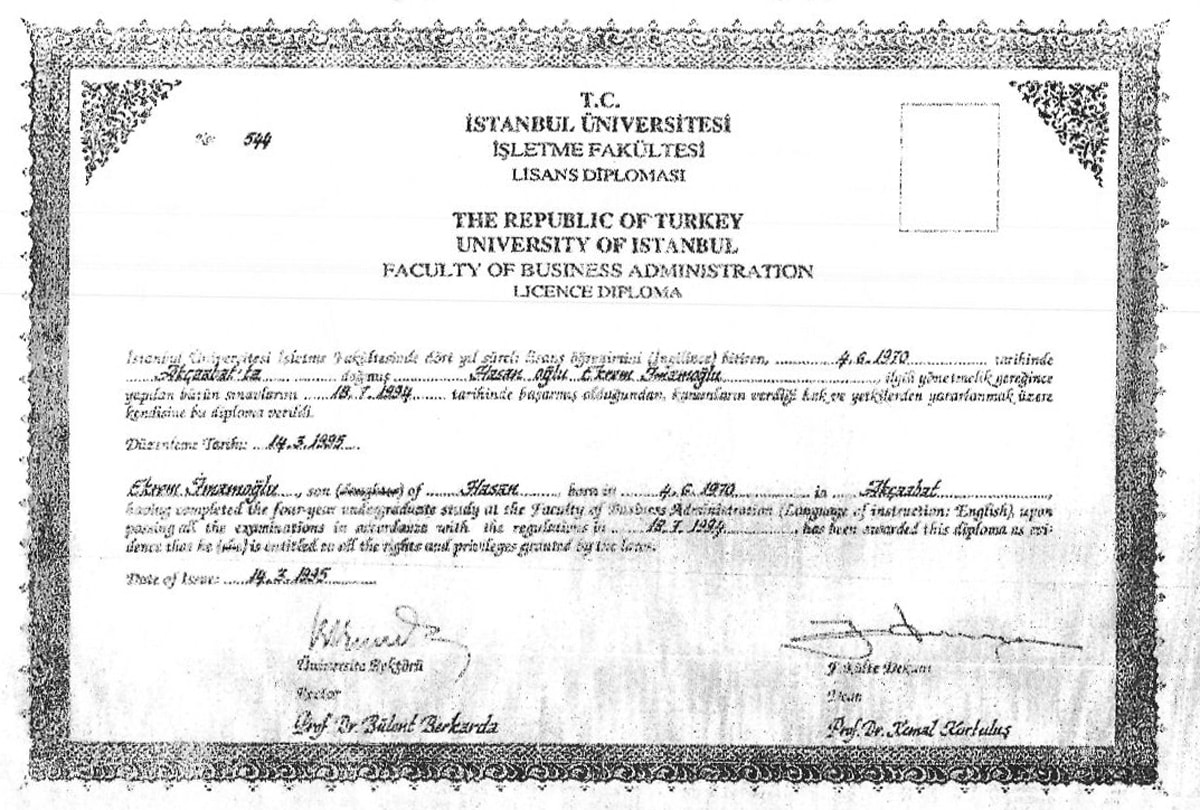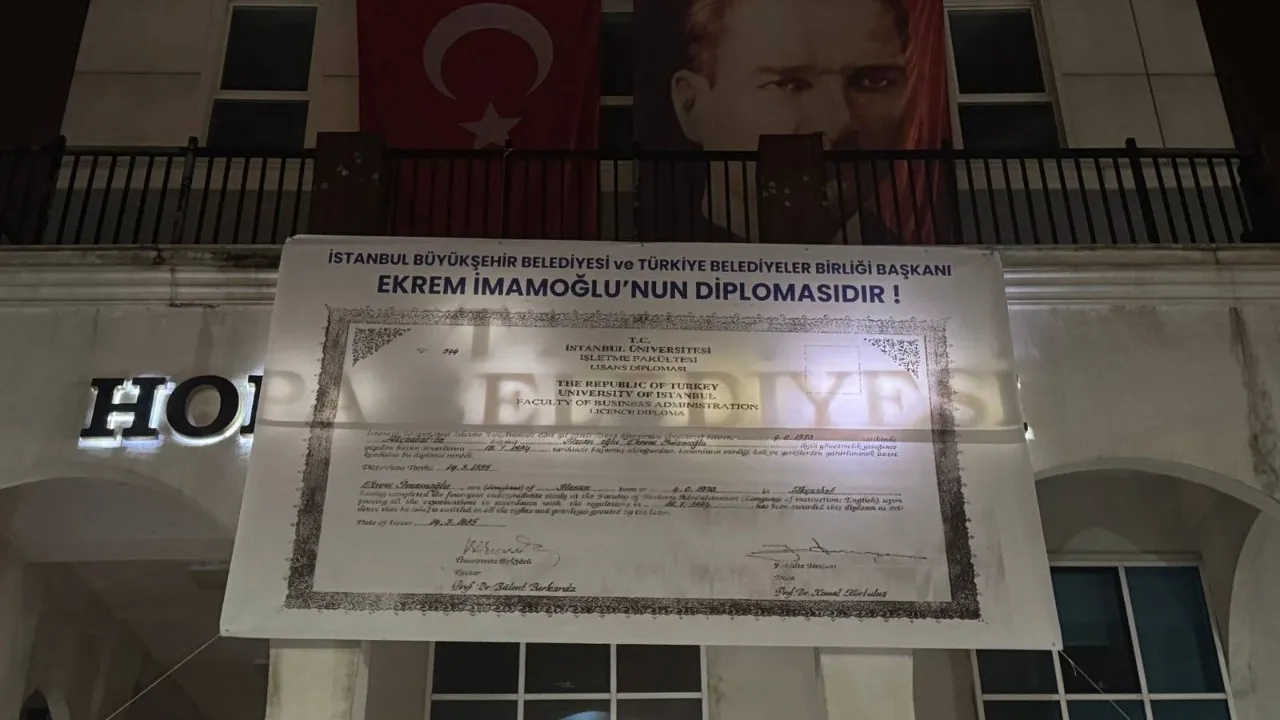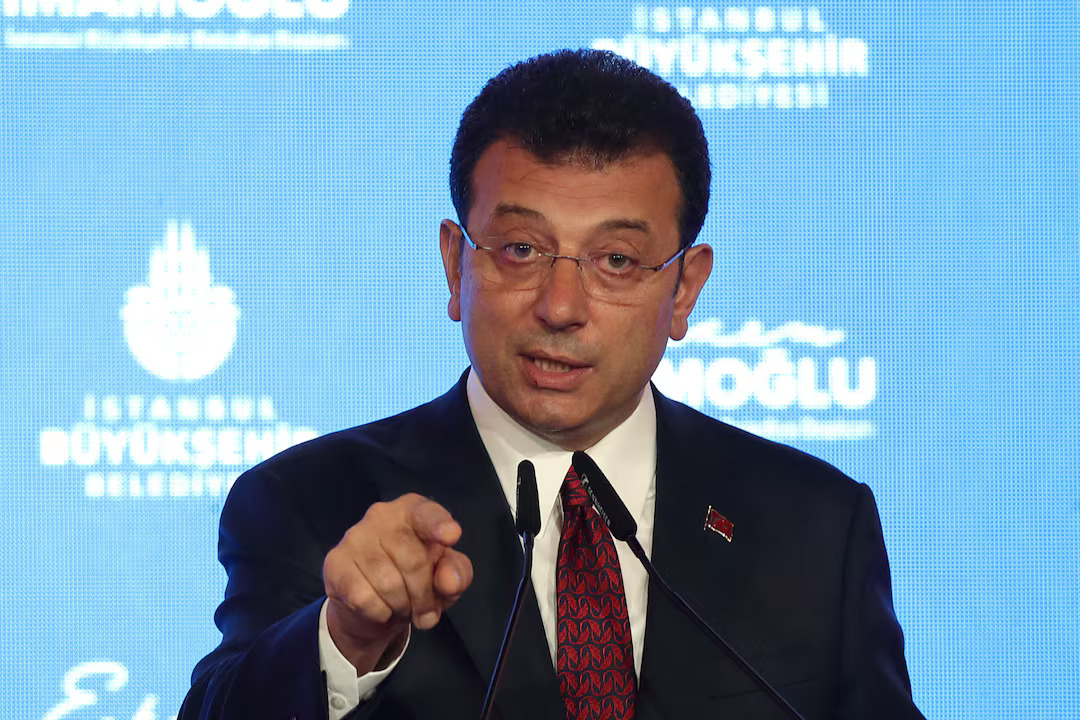Istanbul mayor Ekrem Imamoglu’s degree was on Tuesday revoked by Istanbul University over a report which found that the university in northern Cyprus at which he began his studies before transferring to Istanbul was not adequately recognised.
Imamoglu was one of 28 people to have his degree revoked, with the university writing that it had revoked his degree on the strength of a report written by Turkey’s higher education council (Yok).
“It has been decided that graduations and degrees will be cancelled by being withdrawn on the grounds of their being absences and clear errors,” the university wrote, adding that the decision will now “be sent urgently” to the Istanbul chief public prosecutor’s office and to Yok’s directorate.
Imamoglu had earlier in the month given testimony at the Istanbul chief public prosecutor’s office, which is investigating accusations of forgery over him and his degree.
On Tuesday evening, he described the university’s decision as “unlawful”, adding that the university’s board of directors “does not have the authority to make such a decision”.
“The authority lies solely with the board of directors of the faculty of business administration. The days when those who made this decision will be held accountable before history and justice are near. The march of our nation, thirsty for justice, law, and democracy, cannot be stopped,” he said.

The saga comes after Imamoglu had declared his intention to run to be Turkey’s next president, with the CHP set to hold an internal election on Sunday to decide who its candidate will be.
Imamoglu is the clear frontrunner to be his party’s candidate, with party leader Ozgur Ozel and Ankara mayor Mansur Yavas both having publicly stated that they will not stand.
However, Turkey forbids people who have not obtained a university degree from running for president, thus meaning that if the revocation of his degree stands, Imamoglu will be ineligible to run.
Ozel made reference to this fact in a speech to mark 110 years since the Battle of Gallipoli, saying the Turkish government is running scared of Imamoglu’s popularity with the electorate.
“1.75 million CHP members will go and determine our presidential candidate this Sunday. [The government] saw an enthusiasm and filed five lawsuits against Ekrem to interrupt, disrupt, cripple, and infect this process. They requested a political ban for him each time,” he began.
He added that these acts “have no place in the conscience of society”, and reiterated Imamoglu’s position that only the board of directors of the faculty of business administration, which is set to convene on Wednesday, has the right to revoke his degree.
“We will not surrender to this. There is a judiciary and there are courts. The truth will out and justice will prevail … If they expect us to take a step back, to bow even one inch, to say one less word, they will be waiting a long time,” he said.
Meanwhile, outside of the bright lights of Turkey’s big cities, one mayor took matters into his own hands.
Utku Cihan, the mayor of the town of Hopa, which is situated in the Artvin province in Turkey’s far northeast near the border with Georgia, hung an enlarged copy of Imamoglu’s degree from the balcony of the Hopa municipality building.
“We do not accept the revocation of mayor Ekrem’s degree and the crimes committed against him! We hung Imamoglu’s diploma from our building! There is no liberation alone! Either we rise together, or not at all,” he said.

Imamoglu first moved to Cyprus in 1988, first studying at Famagusta’s Eastern Mediterranean University before transferring to Kyrenia’s Girne American University. He then transferred to Istanbul University in 1990, where he graduated with a bachelor’s degree in business administration in 1994.
The two points on which the case against rests are a Yok decision taken in November 1991 stating that it was “not possible” to recognise the Kyrenia university, and the publication of a regulation in Turkey’s official government gazette in 1996 stipulating that Yok recognition of a university be a legal standard for university transfers.
Imamoglu’s lawyer Mehmet Pehlivanli pointed out that both of these decisions were taken after Imamoglu transferred from Kyrenia to Istanbul in 1990, adding that it is “not possible to explain the retroactive application of a rule introduced six years later within the law”.
The prosecution has insisted that decision not to recognise the university in Kyrenia was not a one-off retroactive move in Imamoglu’s case, but that letters had been sent by Yok to various Turkish universities in 1988, 1991, and 1992 stating that the only university in the north it recognised was the Eastern Mediterranean University.
Earlier, Ozel had made reference to suspicions over the validity of Turkish President Recep Tayyip Erdogan’s degree.
“It means they have sunk to this. Recep Tayyip Erdogan’s degree has been spoken about for 23 years, and they have been talking and talking. He cannot find a friend from university, and they talk about that. No one remembers him and they talk about that,” he said.
He then made reference to former CHP politician Aydin Ayaydin, who said he had studied together with Erdogan at Istanbul’s Marmara University, before then being named as Erdogan’s AK Party’s candidate in the Aegean city of Mugla last year.
“Even when there is an opposition MP, he remembers him alone, he says it, and then it is seen that he goes and changes parties, and he becomes an AK Party mayoral candidate, and so on … He was the only one from that school who could remember this.
“He was a CHP MP, we said, oh my god! Then, he remembered this, then he changed parties, then he became the AK Party’s candidate in Mugla. Apart from him, there are no witnesses … About Ekrem Imamoglu, all of a sudden, they are taking it seriously and trying to investigate it,” he said.






Click here to change your cookie preferences